interpersonal trust and knowledge sharing-问卷来源7
- 格式:pdf
- 大小:388.72 KB
- 文档页数:12
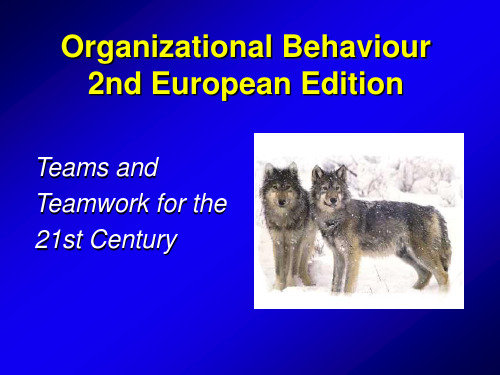
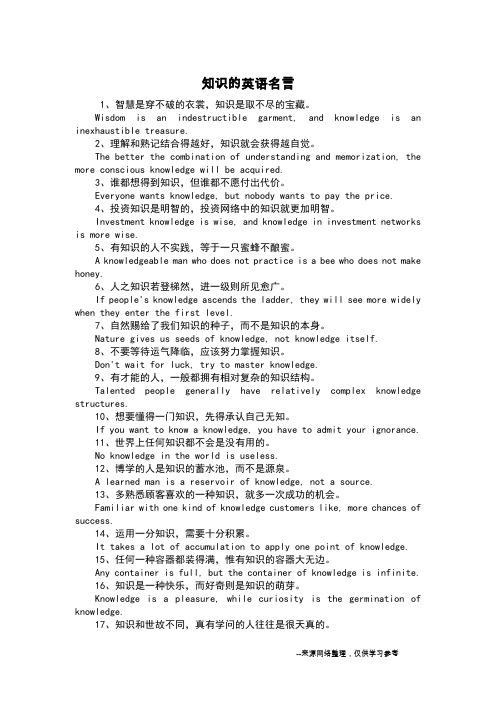
知识的英语名言1、智慧是穿不破的衣裳,知识是取不尽的宝藏。
Wisdom is an indestructible garment, and knowledge is an inexhaustible treasure.2、理解和熟记结合得越好,知识就会获得越自觉。
The better the combination of understanding and memorization, the more conscious knowledge will be acquired.3、谁都想得到知识,但谁都不愿付出代价。
Everyone wants knowledge, but nobody wants to pay the price.4、投资知识是明智的,投资网络中的知识就更加明智。
Investment knowledge is wise, and knowledge in investment networks is more wise.5、有知识的人不实践,等于一只蜜蜂不酿蜜。
A knowledgeable man who does not practice is a bee who does not make honey.6、人之知识若登梯然,进一级则所见愈广。
If people's knowledge ascends the ladder, they will see more widely when they enter the first level.7、自然赐给了我们知识的种子,而不是知识的本身。
Nature gives us seeds of knowledge, not knowledge itself.8、不要等待运气降临,应该努力掌握知识。
Don't wait for luck, try to master knowledge.9、有才能的人,一般都拥有相对复杂的知识结构。

勤奋的重要性英语作文勤奋的重要性The Importance of Diligence勤奋是成功的关键之一它在个人成长和职业发展中扮演着至关重要的角色。
本文将探讨勤奋的重要性以及它如何影响我们的生活。
Diligence is one of the keys to success playing a crucial role in personal growth and career development. This article will explore the importance of diligence and how it affects our lives.首先勤奋能够帮助我们更好地学习。
通过持续不断的努力我们可以掌握更多的知识和技能从而在学术和专业领域取得进步。
例如勤奋的学生通常能够获得更好的成绩因为他们投入了更多的时间和精力来学习。
Firstly diligence can help us learn better. Through continuous effort we can master more knowledge and skills thus making progress in academic and professional fields. For example diligent students usually achieve better grades because they invest more time and energy in learning.其次勤奋能够培养我们的自律和毅力。
当我们面对困难和挑战时勤奋的态度可以帮助我们坚持下去不轻易放弃。
这种坚持不懈的精神对于实现长期目标和克服生活中的障碍至关重要。
Secondly diligence can cultivate our selfdiscipline and perseverance. When we face difficulties and challenges a diligent attitude can help us persevere and not give up easily. This spirit of persistence is crucial for achieving longterm goals and overcoming obstacles in life.此外勤奋还能够提高我们的效率和生产力。

bec中级口语讲义汇总为了帮助大家高效备考bec口语,提高口语水平,下面小编给大家带来bec中级口语讲义汇总,希望大家喜欢!bec中级口语讲义1Ⅰ Life EnglishTalking about money1.If you have money, you can easily make money. Money makes money.Money begets money.If you are in debt, you lose your self-respect.You lose your motivation. Your debt continues to grow.You start to worry.You need to borrow more money. You get even deeper in debt.2.Money comes.Money goes. But the memory is always there.Money talks. Money rules.Money is power.3.Money burns a hole in your pocket.It goes out as fast as it comes in.You’re a spendthrift.Don’t squander your hard-earned money.Put your savings in the bank.Never live beyond your means.Be a good consumer.Be a smart shopper.Be a clever buyer.Ⅱ Presentation TopicsTeam WorkWHAT IS IMPORTANT WHEN…?MANAGING A PROJECTl ENCOURAGING TEAMWORKl KEEPING TO SCHEDULEWHAT IS IMPORTANT WHEN…?CHOOSING PEOPLE TO WORK IN TEAMSl VARIETY OF EXPERIENCEl PERSONAL QUALITIESKey point: improve working efficiency. This plays a crucial role in the commercial practice in Western world.Explain the importance of team work:Teamwork reflects the combined experiences, knowledge, intelligence and views of a group of people, so it will definitely improve the quality and efficiency of the work.If the participants worked together, it would be easy for them to come up with creative ideas. This is particularly valuable for a relatively complex work, for the people working in a team, if one of them gets stuck on a matter, others/the rest could chip in their ideas and get the problem sorted. But if you work on your own, for instance, you are the sole manager in the department.If people did not work as a team, everyone would have to wait for the decisions made by the manager and it was not easy to get people to take on responsibility for anything.A huge and complicated project is not possible to be completed/done by merely one person. For instance, 3 Gorges project-a huge amount of money, 30 million people have to emigrate to elsewhere, a lot of commercial contractsYou will get bored quickly if you work on you own. But if you work in a team…Working in a team can increase personal awareness of abilities and complementary skills in colleague.How to improve teamwork:General ideas; friendly atmosphere; not bossy; patient; good manners; modest; leadership; good interpersonal skills; variety of experienceVariety of experience and a broad horizon would help to tackle urgent matters and establish his or her personal prestige. Well-experienced staff are capable of overcoming storms and crises.On coming across problematic issues, new or inexperienced staff usually will feel depressed and even start to panic. One or a number of experienced staff will, in this kind of situation, automatically become the spiritual leaders of the team and can get the issues in question solved quickly.A wide range of experiences are important to a team member, because you never know what kind of problems might suddenly come up to you. Experiences in different fields will enhance the chance of successfully sorting out the problem with your knowledge which is based on your past experience.Personal qualities:The basis of the team work is mutual trust and friendly atmosphereGood manners, not too bossy, patient, modest, leadership, good interpersonal skills.Project Managementbec中级口语讲义2Ⅱ Presentation ExamplePART 2: Mini-presentationA: WHAT IS IMPORTANT WHEN…?Selecting applicants for a jobWorking experiencePersonal qualitiesSample 1I choose topic A-what is important when selecting applicants for a job. As to this topic,as far as I am concerned, there are 3 things to consider.First, I think working experience is very important when selecting applicants. Applicants who have already had the work experience in the relevant fields will learn the new job easier and quicker. And it will also save the company a lot of training fees if the applicant has related experience.Second, we must consider the personal qualities of the applicants, such as personality and health. Companies tend to employ people whose character fits a special job. For example, consulting company tends to employ applicant who is analytical and knowledgeable, but advertising agents like their employees to be energetic and creative.Third, I believe language is of great importance when selecting applicants. Nowadays, we do business with people from all over the world. Always we buy goods from Africa, and sell our electronic product to Europe ; a foreign language especially English is needed if the company wants to expand to the world. Applicants who can speak one or more foreign languages will have a better chance to get the job.Sample 2As we all know, the criteria used by HR professionals in screening and selecting applicants normally include such factorsas working experience, personal qualities and communicative skills.Firstly, we pay a lot of attention to working experience of the applicant. A person with a solid record of related experience is more likely to fit in with a new company. Therefore he or she can be trusted to fulfill the tasks and solve the problems in a more professional and competent way.In addition to this, we also look at the personal qualities of the applicant. Do es he or she has integrity, perseverance or ‘can do' spirit? Surely any organization can benefit from the reliability, devotion and enthusiam of its employees.Finally, good communicative skills such as interpersonal skills and team spirit are also becoming an important precondition in selecting qualified employees.B: WHAT IS IMPORTANT WHEN…?Preparing for a job interviewStudying the job advertisementFinding out about the companyBefore you go for an interview, you must make preparations so as to face the interviewer with more confidence. They include studying the job advertisement, finding out about the company, preparing yourself psychologically, etc.Firstly, you should study the job advertisement carefully so that you can match your knowledge, skills and abilities with the specifications required for the post. You must assure the interviewer that you have all the qualifications required, so you are the right sort of person they are looking for.Secondly, you should know more about the company, such as its profile, structure, existing problems, requirements, campaigns and future plans. As a Chinese saying goes: “knowthe opponent and know yourself, and you can fight a hundred battles without defeat.”Finally, you should also prepare yourself psychologically and this will help you combat stress. Rehearsing the interview with your friends, for example, is a good relaxation exercise that can install confidence in you.Ⅲ Presentation Discourse Management1. Opening SentenceWell, I'd like to make a short/brief/mini/one-minute presentation on the topic…2. Body (一般讲 2-3 个要点,根据语速和知识点调整)First,…Second….Third,…3. Closing SentenceAnyway, that's why I think so.Thank you very much.Thank you for taking your time.Thank you for listening.bec中级口语讲义3Financial Benefits:Managers, company owners and supervisors have always been frustrated and bewildered by employees with little or no motivation.Staff always want reward for their contribution to the company and what they are worth. Such factors are just like market forces. The fundamental reason of looking for a job is to get pay. Staff do the job what they are paid for. However, quite often, the staff work overtime under their managers’ demand. If the company fails to give proper financial benefits staff mightsubsequently feel not being fairly treated, and therefore frustrate their enthusiasm for their work.Staff want some sort of recognition for the job that they do. Correct financial benefits plan will arouse their enthusiasm; otherwise they would feel being ignored.The job that the staff are doing is not always interesting, or the working environment may not be pleasant, or their colleagues might not be very helpful and cooperative. In this kind of situation/under the kind of circumstance, the staff would become stressful and uninterested in their job. Correct financial benefits can normally distract staff from their dissatisfaction with….Career development/structure:Job-hunting is always a two-way process. On one hand, the employees look for their ideal jobs, on the other hand the employer, at the same time, look for competitive people. An employer has a number of methods to attract the best people into its business. Such as high pay, traveling opportunities, company cars and training/career development opportunities.Good educational background is not the only element that the future employers will take into account when they look for someone in the job market. Postgraduate qualifications and professional trainings are equally or even more important than the higher education degrees. When the HR managers only have 30 seconds to go through each applicant’s CV, the sector that will catch their eyes are normally your qualification and professional training experiences, which show whether you suit their vacant positions.Nowadays, very few people would like to go for that kind of job-for-life posts. They all wish to have their jobs better andbetter. If an employee is able to get the opportunities to obtain some sort of professional training during the course of employment, this experience will definitely enhance his value in the employment market and therefore benefits his future job-hunting.So in the two-way job-seeking process, while the employer is choosing its favorite people, the wise future employee will consider the training and career development opportunities with his/her future employer and try to make himself/herself more competitive in the employment market.Ⅲ Business Dialogue1) Negotiating a Job OfferEmployer: would you consider an offer of $56,000 per year?Ms. Wilson: What kind of benefits are talking about?Employer: Our standard package includes health insurance, two weeks vacation and a company car.Ms. Wilson: Are these things negotiable?Employer: Uh…not normally. What do you have i n mind ?Ms. Wilson: Vacation time is important to me. I would be willing to give up these other items in order to receive more vacation days.Employer: What an interesting idea, Ms. Wilson. Would you also be willing to accept a cut in initial salary?Ms. Wilson: possibly. What do you have in mind ?2) Employee Pay RaiseBoss: You have done an excellent job this year and we are pleased with the results.Employee: I am glad that you have been happy with my performance.Boss: As a result of your performance, we happy to offer youthe position of manager.Employee: Does this title come with an increase in salary?bec中级口语讲义4ⅰ 、 Why take BEC exams?strong growthrigorous quality controlwide suitabilitywide business contextvalue for study and business careerinternational recognition for work and studyⅱ 、 What is International Business English? 什么是国际商务英语?国际商务英语,指的是人们从事国际商务活动中所使用的具有行业特征的英语,这些行业包括:国际贸易、国际金融、国际会计、国际运输、国际商法、保险、银行、经济、营销、物流、企业管理、商业服务等。

共同信任和开放是促进合作的关键英语作文Trust and Openness: The Keys to Fostering CollaborationIn today's increasingly interconnected world, the ability to collaborate effectively has become a crucial skill for individuals, organizations, and nations alike. As we navigate the complex challenges of the 21st century, from global issues to local concerns, the need for collaborative solutions has never been more pressing. At the heart of successful collaboration lies the foundation of trust and openness, two fundamental elements that can unlock the potential for meaningful cooperation and progress.Trust, in the context of collaboration, is the firm belief in the reliability, integrity, and honesty of our partners. It is the cornerstone upon which all meaningful relationships are built, both in our personal lives and in our professional endeavors. When we trust one another, we are more willing to share information, resources, and ideas, knowing that our contributions will be respected and our vulnerabilities will be protected. This sense of mutual understanding and confidence fosters an environment where individuals and groups can work together seamlessly, leveraging their diverse strengths and perspectives to achieve common goals.Openness, on the other hand, is the willingness to be transparent, to communicate freely and honestly, and to embrace different perspectives. In a collaborative setting, openness allows for the free flow of information, the sharing of knowledge, and the exploration of new ideas. It creates an atmosphere of inclusivity, where all voices are heard and valued, and where diverse viewpoints are welcomed as opportunities for growth and innovation. When individuals and organizations are open with one another, they are more likely to identify and address potential challenges, to learn from their mistakes, and to find creative solutions that benefit the collective.The interplay between trust and openness is crucial in fostering successful collaboration. When trust is present, individuals and groups are more willing to be open with one another, sharing their thoughts, ideas, and concerns without fear of judgment or retaliation. Conversely, when openness is cultivated, it helps to build trust, as participants come to understand and appreciate the perspectives and intentions of their collaborators.This dynamic relationship between trust and openness can be observed in various collaborative settings, from small-scale team projects to large-scale international partnerships. In the business world, for example, successful companies often prioritize the development of trust and openness within their organizationalculture. By encouraging open communication, transparency, and a shared sense of purpose, these companies are able to foster an environment where employees feel empowered to contribute their ideas, take calculated risks, and work together towards common goals.Similarly, in the realm of international diplomacy, the ability to build trust and maintain openness between nations is essential for the resolution of global challenges. When countries are willing to engage in honest dialogue, share information, and find common ground, they are more likely to develop collaborative solutions to issues such as climate change, global health crises, and economic instability.The benefits of trust and openness in collaboration are manifold. By cultivating these qualities, individuals, organizations, and nations can unlock the power of collective intelligence, leveraging the diverse skills, experiences, and perspectives of their collaborators to tackle complex problems. Trust and openness also promote a sense of ownership and accountability, as participants feel invested in the success of the collaborative endeavor and are more willing to take responsibility for their actions.Moreover, the presence of trust and openness can have a transformative effect on the collaborative process itself. When individuals and groups feel safe to express their ideas, challengeassumptions, and engage in constructive debate, they are more likely to generate innovative solutions that challenge the status quo. This creative energy, fueled by an atmosphere of trust and openness, can lead to breakthroughs that have the potential to reshape entire industries, communities, and even the global landscape.In conclusion, trust and openness are the keys to fostering successful collaboration in the modern world. By prioritizing these essential elements, individuals, organizations, and nations can create an environment where diverse perspectives are welcomed, knowledge is freely shared, and collective action can be taken to address the most pressing challenges of our time. As we continue to navigate the complexities of the 21st century, the ability to collaborate effectively, grounded in trust and openness, will be a crucial driver of progress and innovation, shaping the future for generations to come.。
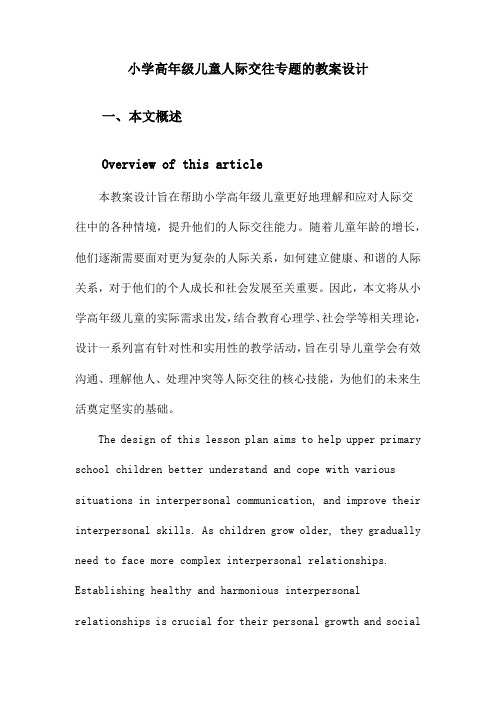
小学高年级儿童人际交往专题的教案设计一、本文概述Overview of this article本教案设计旨在帮助小学高年级儿童更好地理解和应对人际交往中的各种情境,提升他们的人际交往能力。
随着儿童年龄的增长,他们逐渐需要面对更为复杂的人际关系,如何建立健康、和谐的人际关系,对于他们的个人成长和社会发展至关重要。
因此,本文将从小学高年级儿童的实际需求出发,结合教育心理学、社会学等相关理论,设计一系列富有针对性和实用性的教学活动,旨在引导儿童学会有效沟通、理解他人、处理冲突等人际交往的核心技能,为他们的未来生活奠定坚实的基础。
The design of this lesson plan aims to help upper primary school children better understand and cope with various situations in interpersonal communication, and improve their interpersonal skills. As children grow older, they gradually need to face more complex interpersonal relationships. Establishing healthy and harmonious interpersonal relationships is crucial for their personal growth and socialdevelopment. Therefore, this article will start from the actual needs of upper primary school children, combined with relevant theories such as educational psychology and sociology, design a series of targeted and practical teaching activities, aiming to guide children to learn core interpersonal skills such as effective communication, understanding of others, and handling conflicts, laying a solid foundation for their future life.在设计教案时,我们将充分考虑到小学高年级儿童的认知特点、兴趣爱好和实际生活经验,力求使教学活动既富有趣味性,又能达到预期的教育目标。
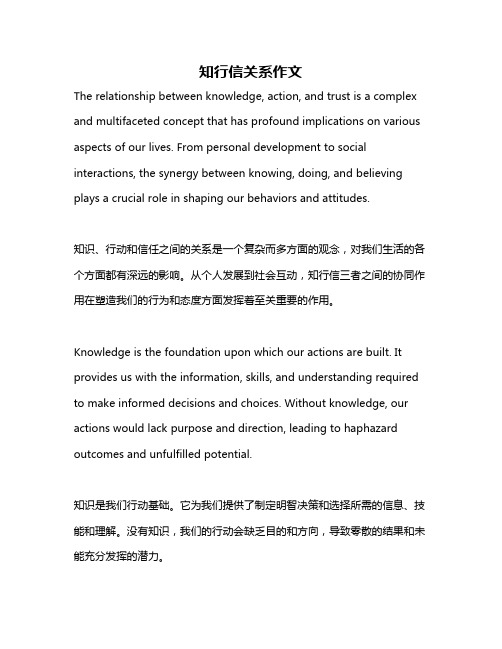
知行信关系作文The relationship between knowledge, action, and trust is a complex and multifaceted concept that has profound implications on various aspects of our lives. From personal development to social interactions, the synergy between knowing, doing, and believing plays a crucial role in shaping our behaviors and attitudes.知识、行动和信任之间的关系是一个复杂而多方面的观念,对我们生活的各个方面都有深远的影响。
从个人发展到社会互动,知行信三者之间的协同作用在塑造我们的行为和态度方面发挥着至关重要的作用。
Knowledge is the foundation upon which our actions are built. It provides us with the information, skills, and understanding required to make informed decisions and choices. Without knowledge, our actions would lack purpose and direction, leading to haphazard outcomes and unfulfilled potential.知识是我们行动基础。
它为我们提供了制定明智决策和选择所需的信息、技能和理解。
没有知识,我们的行动会缺乏目的和方向,导致零散的结果和未能充分发挥的潜力。
Moreover, the relationship between knowledge and action is symbiotic - each one reinforces and complements the other. Knowledge informs our actions, while our actions, in turn, expand our knowledge through experience and experimentation. This dynamic interplay between knowing and doing is essential for personal growth and development.此外,知识和行动之间的关系是相辅相成的——彼此相互加强和互补。
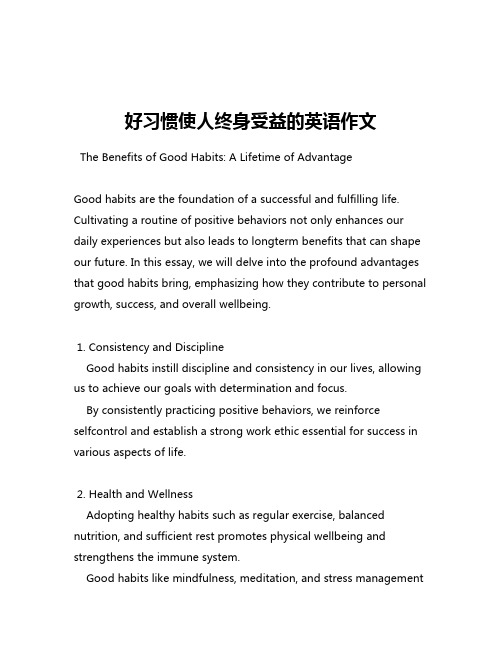
好习惯使人终身受益的英语作文The Benefits of Good Habits: A Lifetime of AdvantageGood habits are the foundation of a successful and fulfilling life. Cultivating a routine of positive behaviors not only enhances our daily experiences but also leads to longterm benefits that can shape our future. In this essay, we will delve into the profound advantages that good habits bring, emphasizing how they contribute to personal growth, success, and overall wellbeing.1. Consistency and DisciplineGood habits instill discipline and consistency in our lives, allowing us to achieve our goals with determination and focus.By consistently practicing positive behaviors, we reinforce selfcontrol and establish a strong work ethic essential for success in various aspects of life.2. Health and WellnessAdopting healthy habits such as regular exercise, balanced nutrition, and sufficient rest promotes physical wellbeing and strengthens the immune system.Good habits like mindfulness, meditation, and stress managementcontribute to mental health, fostering emotional stability and resilience in the face of challenges.3. Personal DevelopmentEngaging in reading, continuous learning, and selfimprovement activities nurtures personal growth and expands knowledge and skills. Habitual practices like setting goals, time management, and selfreflection pave the way for selfdevelopment, boosting confidence and enhancing decisionmaking abilities.4. Productivity and SuccessGood habits increase efficiency and productivity by optimizing time utilization and prioritizing tasks effectively.Through habits like setting priorities, organizing workspaces, and minimizing distractions, individuals can achieve higher levels of success in their endeavors.5. Relationship BuildingCultivating habits of empathy, active listening, and effective communication enhances interpersonal relationships and fosters trust and understanding.Good habits in social interactions, conflict resolution, and teamwork strengthen personal connections and create a positive impact on professional and personal networks.ConclusionIn conclusion, the power of good habits lies in their ability to shape our lives positively and contribute to longterm success and wellbeing. By embracing and nurturing beneficial behaviors, individuals can cultivate a lifestyle that not only brings immediate advantages but also ensures a lifetime of benefits. Therefore, it is imperative to recognize the significance of good habits in fostering personal growth, success, and overall fulfillment.。
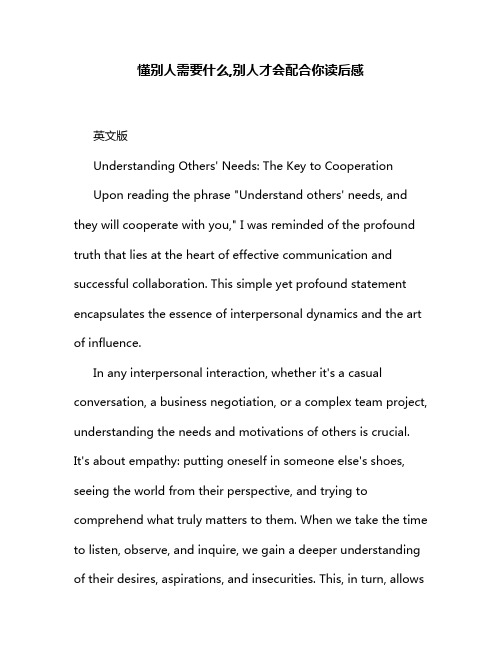
懂别人需要什么,别人才会配合你读后感英文版Understanding Others' Needs: The Key to CooperationUpon reading the phrase "Understand others' needs, and they will cooperate with you," I was reminded of the profound truth that lies at the heart of effective communication and successful collaboration. This simple yet profound statement encapsulates the essence of interpersonal dynamics and the art of influence.In any interpersonal interaction, whether it's a casual conversation, a business negotiation, or a complex team project, understanding the needs and motivations of others is crucial.It's about empathy: putting oneself in someone else's shoes, seeing the world from their perspective, and trying to comprehend what truly matters to them. When we take the time to listen, observe, and inquire, we gain a deeper understanding of their desires, aspirations, and insecurities. This, in turn, allowsus to speak their language, address their concerns, and offer solutions that resonate with them.The beauty of this approach is that it fosters trust and respect. When others feel heard and understood, they are more likely to open up, share their ideas and perspectives, and collaborate willingly. They feel valued and recognized, and this positive emotional connection often leads to more fruitful outcomes.Moreover, understanding others' needs does not mean compromising one's own. It's about finding a balance, a middle ground where both parties can thrive. It's about building bridges, not walls, and creating win-win scenarios where everyone feels included and satisfied.In conclusion, understanding others' needs is not just a skill; it's a way of life. It's about creating meaningful connections, fostering cooperation, and building sustainable relationships. As we continue to interact with diverse individuals and groups, letus remember that the key to their cooperation lies in our ability to truly understand and appreciate their needs.中文版理解他人的需求:合作的关键在阅读“懂别人需要什么,别人才会配合你”这句话时,我想起了有效沟通和成功合作的核心真理。
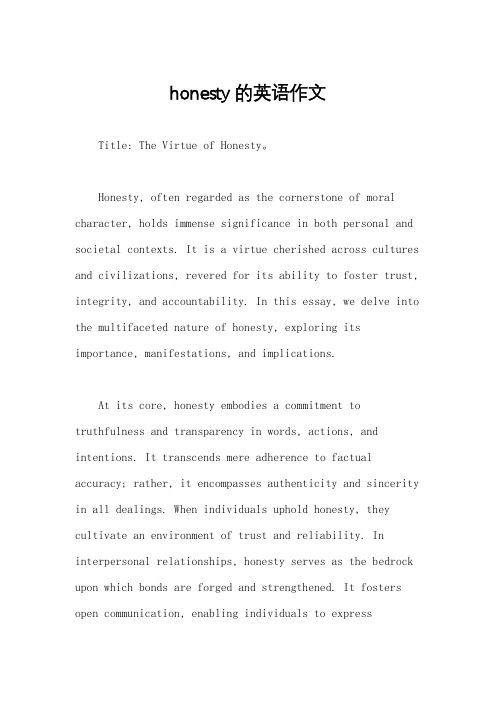
honesty的英语作文Title: The Virtue of Honesty。
Honesty, often regarded as the cornerstone of moral character, holds immense significance in both personal and societal contexts. It is a virtue cherished across cultures and civilizations, revered for its ability to foster trust, integrity, and accountability. In this essay, we delve into the multifaceted nature of honesty, exploring its importance, manifestations, and implications.At its core, honesty embodies a commitment to truthfulness and transparency in words, actions, and intentions. It transcends mere adherence to factual accuracy; rather, it encompasses authenticity and sincerity in all dealings. When individuals uphold honesty, they cultivate an environment of trust and reliability. In interpersonal relationships, honesty serves as the bedrock upon which bonds are forged and strengthened. It fosters open communication, enabling individuals to expressthemselves genuinely and connect on a deeper level.Moreover, honesty cultivates integrity, aligning one's actions with ethical principles and values. It entails the courage to confront challenges with truthfulness and the willingness to accept responsibility for one's choices. Through honesty, individuals uphold their moral compass, navigating ethical dilemmas with integrity and conviction. In essence, honesty is not merely a virtue to be practiced in moments of convenience but a guiding principle that shapes character and behavior.In the realm of governance and leadership, honesty assumes paramount importance. Leaders who embody honesty inspire confidence and respect among their constituents. By fostering transparency and accountability, they cultivate a culture of trust within organizations and society at large. Conversely, a lack of honesty erodes trust, leading to disillusionment and discord. History bears witness to the downfall of regimes and institutions undermined by deceit and corruption. Thus, honesty stands as a fundamentalpillar of effective governance and ethical leadership.Furthermore, honesty extends beyond individual interactions to encompass broader social and economic dimensions. In the marketplace, honesty is synonymous with integrity and fair dealing. Businesses that prioritize honesty build enduring relationships with customers based on trust and reliability. Conversely, deceptive practices breed distrust and tarnish reputations, ultimately undermining long-term success. Moreover, honesty in economic transactions ensures fairness and equity, contributing to the stability and prosperity of society as a whole.In the pursuit of academic and intellectual endeavors, honesty is indispensable. Scholars and researchers uphold the principles of academic integrity by acknowledging sources, adhering to ethical standards, and presenting findings truthfully. Plagiarism and academic dishonesty undermine the integrity of scholarly discourse, eroding the foundation of knowledge and innovation. Thus, honesty in academia is not only a matter of personal integrity but a collective commitment to the pursuit of truth andintellectual rigor.However, honesty is not without its complexities and challenges. In a world characterized by moral ambiguity and competing interests, individuals may face dilemmas where honesty conflicts with other values or obligations. In such situations, the path of honesty requires moral discernment and courage. It entails weighing the consequences of one's actions and upholding ethical principles, even in the face of adversity. While honesty may entail personal sacrifice or discomfort, its long-term benefits outweigh transient gains derived from deception or deceit.In conclusion, honesty stands as a timeless virtue that transcends cultural, social, and economic boundaries. It is the foundation of trust, integrity, and accountability in personal relationships, governance, business, academia, and beyond. Upholding honesty requires courage, integrity, and a steadfast commitment to truthfulness and transparency. In a world fraught with complexities and uncertainties, honesty serves as a guiding light, illuminating the path towards moral clarity and ethical conduct. As individualsand as a society, we must cherish and uphold honesty as an indispensable virtue that enriches our lives and strengthens the fabric of our communities.。

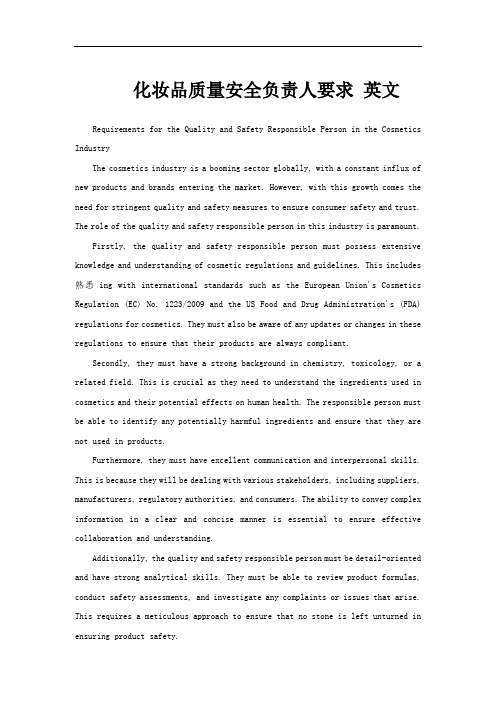
化妆品质量安全负责人要求英文Requirements for the Quality and Safety Responsible Person in the Cosmetics IndustryThe cosmetics industry is a booming sector globally, with a constant influx of new products and brands entering the market. However, with this growth comes the need for stringent quality and safety measures to ensure consumer safety and trust. The role of the quality and safety responsible person in this industry is paramount.Firstly, the quality and safety responsible person must possess extensive knowledge and understanding of cosmetic regulations and guidelines. This includes 熟悉ing with international standards such as the European Union's Cosmetics Regulation (EC) No. 1223/2009 and the US Food and Drug Administration's (FDA) regulations for cosmetics. They must also be aware of any updates or changes in these regulations to ensure that their products are always compliant.Secondly, they must have a strong background in chemistry, toxicology, or a related field. This is crucial as they need to understand the ingredients used in cosmetics and their potential effects on human health. The responsible person must be able to identify any potentially harmful ingredients and ensure that they are not used in products.Furthermore, they must have excellent communication and interpersonal skills. This is because they will be dealing with various stakeholders, including suppliers, manufacturers, regulatory authorities, and consumers. The ability to convey complex information in a clear and concise manner is essential to ensure effective collaboration and understanding.Additionally, the quality and safety responsible person must be detail-oriented and have strong analytical skills. They must be able to review product formulas, conduct safety assessments, and investigate any complaints or issues that arise. This requires a meticulous approach to ensure that no stone is left unturned in ensuring product safety.Lastly, they must have a commitment to continuous improvement and learning. The cosmetics industry is constantly evolving, and new ingredients, technologies, and challenges emerge. The responsible person must stay up-to-date with these developments and be willing to adapt and improve their knowledge and skills accordingly.In conclusion, the role of the quality and safety responsible person in the cosmetics industry is crucial. They are responsible for ensuring that products are safe for consumers and comply with regulations. To fulfill this role effectively, they must possess extensive knowledge, skills, and a commitment to continuous learning and improvement.。

生活中需要信任英语作文Title: The Essential Role of Trust in Life。
Trust is the cornerstone of human interactions and relationships, playing a vital role in both personal and professional spheres. In our daily lives, from the simplest interactions to the most complex collaborations, trust serves as a fundamental currency that lubricates the wheels of society. Without trust, the fabric of our communities would fray, and progress would stagnate. Therefore, it is imperative to recognize the significance of trust and nurture it in every aspect of our lives.First and foremost, trust is indispensable in interpersonal relationships. Whether it be friendships, romantic partnerships, or familial bonds, trust forms the bedrock upon which these connections are built. In the absence of trust, relationships become fragile, susceptible to doubt and insecurity. When we trust others, we open ourselves up to vulnerability, confident that our trustwill be reciprocated. This mutual trust fosters intimacy, empathy, and understanding, enriching our lives immeasurably.Moreover, trust is essential in professional settings.In the workplace, trust facilitates effective collaboration, enabling teams to work harmoniously towards common goals. When colleagues trust each other, they communicate more openly, share responsibilities willingly, and support each other through challenges. Furthermore, trust between employers and employees is crucial for a healthy work environment. Employees who trust their employers are more engaged, motivated, and loyal, driving organizational success.Beyond interpersonal and professional relationships, trust permeates every facet of society. In our interactions with institutions, such as governments, financial systems, and healthcare providers, trust is paramount. Citizenstrust their governments to uphold the rule of law andprotect their rights. Investors trust financialinstitutions to safeguard their assets and provide reliablereturns. Patients trust healthcare professionals to prioritize their well-being and provide quality care. Without this trust, societal cohesion would falter, eroding the foundations of civilization.Additionally, trust plays a pivotal role in fostering innovation and progress. In academic and scientific communities, researchers must trust in the validity of each other's work to build upon existing knowledge and make breakthroughs. Similarly, in business and technology sectors, trust is essential for the adoption of new ideas, products, and services. Consumers must trust companies to deliver on their promises, whether it be product quality, data privacy, or customer support. This trust cultivates a culture of innovation, driving economic growth and societal advancement.However, trust is not easily gained nor maintained. It requires time, effort, and integrity to establish trustworthiness. Honesty, reliability, and transparency are the cornerstones of building trust in any relationship or institution. Moreover, trust is fragile and can be easilyshattered by betrayal, dishonesty, or incompetence. Once broken, trust must be painstakingly rebuilt, often requiring even greater commitment and humility.In conclusion, trust is a precious commodity that underpins the fabric of society. From interpersonal relationships to professional collaborations, from institutions to innovations, trust permeates every aspect of our lives. Recognizing the importance of trust and actively cultivating it in our interactions is essential for fostering healthy relationships, driving progress, and sustaining a thriving society. As we navigate the complexities of life, let us remember that trust is not just a choice but a necessity for a fulfilling and harmonious existence.。
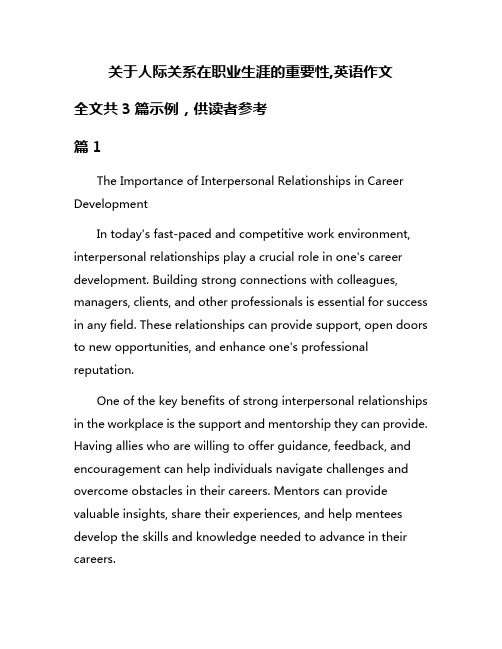
关于人际关系在职业生涯的重要性,英语作文全文共3篇示例,供读者参考篇1The Importance of Interpersonal Relationships in Career DevelopmentIn today's fast-paced and competitive work environment, interpersonal relationships play a crucial role in one's career development. Building strong connections with colleagues, managers, clients, and other professionals is essential for success in any field. These relationships can provide support, open doors to new opportunities, and enhance one's professional reputation.One of the key benefits of strong interpersonal relationships in the workplace is the support and mentorship they can provide. Having allies who are willing to offer guidance, feedback, and encouragement can help individuals navigate challenges and overcome obstacles in their careers. Mentors can provide valuable insights, share their experiences, and help mentees develop the skills and knowledge needed to advance in their careers.In addition to support and mentorship, strong interpersonal relationships can also lead to new opportunities and career growth. Building a network of contacts within and outside of one's organization can increase visibility and create new avenues for advancement. Connections with influential individuals can lead to job offers, promotions, and other career opportunities that may not have been available otherwise.Furthermore, strong interpersonal relationships can enhance one's professional reputation and credibility. Colleagues who trust and respect each other are more likely to collaborate effectively, share resources, and work together towards common goals. By building positive relationships with others, individuals can establish a reputation for being reliable, trustworthy, and professional, which can enhance their career prospects and help them stand out in a competitive job market.Overall, the importance of interpersonal relationships in career development cannot be overstated. Building strong connections with others can provide support, open doors to new opportunities, and enhance one's professional reputation. By investing in relationships with colleagues, mentors, clients, and other professionals, individuals can increase their chances of success and achieve their career goals.篇2The Importance of Interpersonal Relationships in Career DevelopmentIntroductionIn today's increasingly interconnected world, the importance of interpersonal relationships in the workplace cannot be overstated. Building and maintaining positive relationships with colleagues, supervisors, clients, and other stakeholders is crucial for career success and personal growth. In this article, we will explor e the role of interpersonal relationships in a person’s career development and outline strategies for cultivating these relationships.Benefits of Strong Interpersonal RelationshipsStrong interpersonal relationships can have numerous benefits for individuals in their professional lives. Firstly, they can enhance teamwork and collaboration, leading to better outcomes on projects and tasks. When colleagues trust and respect each other, they are more likely to communicate effectively, share ideas, and work towards common goals.Additionally, positive relationships with supervisors and managers can open up opportunities for career advancementand growth. Managers are more likely to promote employees who demonstrate strong interpersonal skills, as they are seen as reliable team players who can lead and motivate others.Furthermore, building relationships with clients and stakeholders can help individuals to expand their professional networks and attract new business opportunities. By developing trust and rapport with clients, individuals can strengthen their reputation and credibility in their field.Strategies for Cultivating Interpersonal RelationshipsTo cultivate strong interpersonal relationships in the workplace, individuals can adopt the following strategies:1. Communication: Effective communication is key to building and maintaining strong relationships. Individuals should strive to be clear, respectful, and empathetic in their interactions with others. Actively listening to colleagues' perspectives and feedback can also help to foster understanding and trust.2. Collaboration: Collaborating with colleagues on projects and tasks can create opportunities for mutual learning and growth. By sharing ideas, resources, and expertise, individuals can build strong working relationships based on trust and cooperation.3. Networking: Networking is a valuable tool for expanding one's professional contacts and opportunities. Attending industry events, conferences, and social gatherings can help individuals to meet new people and form connections that can benefit their career development.4. Conflict resolution: Conflict is a natural part of any workplace environment, but how it is handled can have a significant impact on relationships. Individuals should strive to address conflicts openly and constructively, seeking win-win solutions that preserve working relationships.5. Emotional intelligence: Developing emotional intelligence can help individuals to navigate complex interpersonal dynamics in the workplace. By understanding and managing their own emotions and empathizing with others, individuals can build stronger relationships and foster a positive work environment.ConclusionIn conclusion, interpersonal relationships play a critical role in a person’s career development and success. By cultivating strong relationships with colleagues, supervisors, clients, and other stakeholders, individuals can enhance teamwork, open up opportunities for advancement, and expand their professional networks. By adopting strategies such as effectivecommunication, collaboration, networking, conflict resolution, and emotional intelligence, individuals can build and maintain positive relationships that contribute to their overall career growth and fulfillment.篇3The Importance of Interpersonal Relationships in Career DevelopmentIntroductionIn the modern workplace, the importance of interpersonal relationships cannot be overstated. Building and maintaining strong connections with colleagues, supervisors, and clients is vital for success in one's career. This article will explore the significance of interpersonal relationships in career development, discussing how they can affect one's professional growth, job satisfaction, and overall success.Professional GrowthEffective communication and relationship-building skills are crucial for professional growth. By developing strong interpersonal relationships, individuals can improve their ability to collaborate effectively with others, resolve conflicts, and achieve common goals. Building trust and rapport withcolleagues and clients can also lead to increased opportunities for learning, mentorship, and career advancement. Furthermore, strong relationships can help individuals navigate the complexities of the workplace and overcome challenges with the support of others.Job SatisfactionInterpersonal relationships play a key role in job satisfaction. Positive relationships with coworkers can enhance morale, motivation, and teamwork. A supportive work environment based on trust and respect can contribute to higher levels of employee engagement and job satisfaction. On the other hand, poor relationships or conflicts with colleagues can lead to stress, low morale, and decreased productivity. By investing in building positive relationships with others, individuals can create a more fulfilling and enjoyable work experience.Networking and OpportunitiesInterpersonal relationships are essential for networking and accessing new opportunities. Building a strong professional network can open doors to potential career prospects, collaborations, and partnerships. By connecting with others in their field, individuals can stay informed about industry trends, job openings, and professional development opportunities.Networking can also provide valuable support and resources for navigating career transitions, seeking advice, or expanding one's professional circle.Conflict ResolutionInterpersonal relationships are crucial for effective conflict resolution in the workplace. Disagreements, misunderstandings, and interpersonal conflicts can arise in any work environment. By fostering positive relationships with colleagues and supervisors, individuals can navigate conflicts more constructively and reach mutually beneficial resolutions. Effective communication, empathy, and a willingness to collaborate can help prevent conflicts from escalating and maintain positive working relationships.Building Trust and CredibilityInterpersonal relationships are built on trust and credibility. By demonstrating integrity, honesty, and reliability in their interactions with others, individuals can establish a reputation for professionalism and trustworthiness. Building trust with colleagues, clients, and supervisors can enhance one's credibility and reputation in the workplace. Trustworthy individuals are more likely to be viewed as reliable partners, collaborators, andleaders, leading to greater opportunities and recognition in their careers.ConclusionIn conclusion, interpersonal relationships are a cornerstone of success in one's career. By investing in building and maintaining positive relationships with colleagues, supervisors, and clients, individuals can enhance their professional growth, job satisfaction, and overall success. Effective communication, trust, empathy, and collaboration are essential skills for fostering strong relationships in the workplace. By prioritizing interpersonal relationships, individuals can create a supportive and productive work environment that contributes to their long-term career development and success.。

谦虚的品质翻译英语作文Title: The Virtue of Humility。
Humility is a quality that transcends cultural and societal boundaries, revered across civilizations and cherished in individuals. It is a trait that fosters harmony, encourages growth, and cultivates empathy. In a world often consumed by self-promotion and ego, humility stands as a beacon of sincerity and authenticity.At its core, humility is the acknowledgment of one's limitations and imperfections. It is the willingness to recognize that no individual possesses all knowledge or skills, and that there is always room for improvement. Rather than boasting about accomplishments or seeking validation, humble individuals prefer to listen and learn from others, valuing diverse perspectives and experiences.Moreover, humility breeds empathy and compassion. By understanding our own fallibility, we become moreempathetic towards the struggles and shortcomings of others. Instead of judging or belittling, humble individuals extend a helping hand and offer support without expecting anything in return. This ability to empathize creates a sense ofunity and fosters stronger interpersonal relationshipsbuilt on trust and mutual respect.In addition, humility is a catalyst for personal growth and development. When we humbly accept feedback and constructive criticism, we open ourselves up toopportunities for self-improvement. Rather than becoming defensive or resentful, we embrace feedback as a valuable tool for growth, recognizing that it is through acknowledging our weaknesses that we can strive to become better versions of ourselves.Furthermore, humility is essential for effective leadership. Leaders who exhibit humility are more approachable and relatable, inspiring trust and loyalty among their followers. Instead of exerting authoritythrough fear or coercion, humble leaders lead by example, demonstrating integrity, empathy, and a willingness toadmit their own mistakes. By creating a culture of humility within their organizations, these leaders foster collaboration and innovation, empowering their teams to achieve collective success.In a society that often values self-promotion and individualism, humility serves as a counterbalance, reminding us of the importance of modesty, gratitude, and humility. It encourages us to celebrate the achievements of others, rather than seeking constant validation for our own accomplishments. Moreover, humility teaches us to appreciate the beauty of simplicity and to find fulfillment in acts of kindness and service to others.In conclusion, humility is a timeless virtue that transcends cultures and societies. It is a quality that fosters harmony, encourages growth, and cultivates empathy. By embracing humility in our lives, we not only become better individuals but also contribute to the creation of a more compassionate and inclusive world.。
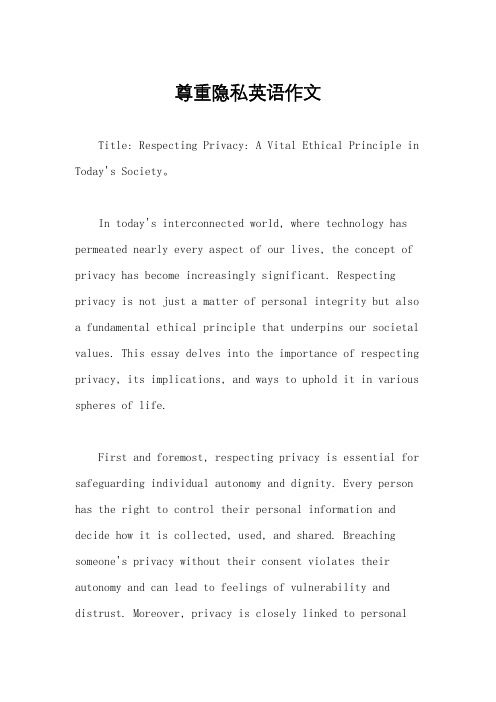
尊重隐私英语作文Title: Respecting Privacy: A Vital Ethical Principle in Today's Society。
In today's interconnected world, where technology has permeated nearly every aspect of our lives, the concept of privacy has become increasingly significant. Respecting privacy is not just a matter of personal integrity but also a fundamental ethical principle that underpins our societal values. This essay delves into the importance of respecting privacy, its implications, and ways to uphold it in various spheres of life.First and foremost, respecting privacy is essential for safeguarding individual autonomy and dignity. Every person has the right to control their personal information and decide how it is collected, used, and shared. Breaching someone's privacy without their consent violates their autonomy and can lead to feelings of vulnerability and distrust. Moreover, privacy is closely linked to personalfreedom, as it allows individuals to express themselves, form relationships, and pursue their goals without fear of unwarranted intrusion or surveillance.Furthermore, respecting privacy fosters trust and strengthens interpersonal relationships. Whether in personal friendships, familial bonds, or professional settings, trust is built upon the understanding that personal information will be handled with care and confidentiality. When people feel confident that their privacy is respected, they are more likely to share their thoughts, feelings, and experiences openly, leading to deeper connections and meaningful interactions.In the digital age, where vast amounts of personal data are generated and exchanged every day, the importance of privacy protection cannot be overstated. Online platforms collect vast troves of user data, ranging from browsing history and social media interactions to location tracking and financial transactions. While this data can be valuable for improving services and personalizing experiences, it also poses significant risks if mishandled or exploited.Unauthorized access to personal data can result in identity theft, financial fraud, and even psychological harm through targeted advertising and manipulation.To uphold privacy in the digital realm, individualsmust be empowered with knowledge and tools to protect their personal information effectively. This includes understanding privacy settings on social media platforms, using strong passwords and encryption methods, and being cautious about sharing sensitive information online. Additionally, policymakers and technology companies have a responsibility to prioritize user privacy by implementing robust data protection measures, transparent data practices, and accountability mechanisms for data breaches.Beyond the digital domain, respecting privacy extendsto various aspects of everyday life, including healthcare, education, and law enforcement. In healthcare, for example, patients trust that their medical records will be kept confidential to ensure privacy and encourage honest communication with healthcare providers. Similarly,students expect their academic performance and personalinformation to be safeguarded by educational institutions to create a conducive learning environment. In law enforcement, the balance between public safety and individual privacy is often tested, highlighting the importance of clear legal frameworks and oversight mechanisms to prevent abuses of power.In conclusion, respecting privacy is not merely a matter of convenience or personal preference but a fundamental ethical principle that underpins individual autonomy, trust, and societal values. In today's interconnected world, where technology blurs the boundaries between public and private spaces, upholding privacy rights is more crucial than ever. By promoting awareness, implementing safeguards, and fostering a culture of respect for privacy, we can create a more equitable and trustworthy society for present and future generations.。

信任的重要性英语作文Title: The Importance of Trust。
Trust is a cornerstone of human relationships, playing a vital role in personal, professional, and societal interactions. Its significance transcends boundaries, impacting every aspect of our lives. In this essay, I will delve into the importance of trust, examining its profound implications and the reasons behind its pivotal role in our lives.First and foremost, trust forms the foundation of meaningful connections between individuals. Whether it's friendships, romantic relationships, or familial bonds, trust fosters intimacy, vulnerability, and mutual understanding. When we trust someone, we feel secure in confiding our thoughts, feelings, and insecurities, knowing that they will respect and support us. This sense of security cultivates deeper connections and enables us to navigate life's challenges with the assurance that we arenot alone.Moreover, trust is indispensable in the realm of business and commerce. In the marketplace, trust is synonymous with reliability, integrity, and credibility. Customers are more likely to patronize businesses that they trust, confident that their transactions will be fair,their products of high quality, and their interests safeguarded. Similarly, trust is the bedrock of successful collaborations and partnerships among professionals. When colleagues trust each other, they collaborate more effectively, communicate openly, and achieve shared goals with greater efficiency.Beyond interpersonal relationships, trust is essential for the functioning of societies and institutions. A society built on trust is characterized by social cohesion, cooperation, and stability. Trust in governmental institutions, for instance, is crucial for fostering civic engagement, upholding the rule of law, and ensuring public welfare. Citizens who trust their government are morelikely to participate in democratic processes, abide bylaws, and contribute to the betterment of society.Furthermore, trust plays a pivotal role in innovation and progress. In scientific communities, trust in the validity of research findings is fundamental for the advancement of knowledge. Peer review, a cornerstone of scientific integrity, relies on trust among researchers to uphold rigorous standards of inquiry and validation. Similarly, trust is indispensable in technological advancements and the adoption of new inventions. Consumers must trust in the safety, reliability, and efficacy of innovations before embracing them in their daily lives.However, despite its profound importance, trust is fragile and easily undermined. Betrayal, deceit, and dishonesty can shatter trust irreparably, leaving behind scars that are difficult to heal. Restoring trust requires genuine remorse, transparency, and consistent efforts to rebuild credibility. Additionally, trust must be nurtured continuously through honest communication, reliability, and accountability.In conclusion, trust is the bedrock of human relationships, the lubricant of societal interactions, and the catalyst for progress and innovation. Its importance cannot be overstated, as it permeates every aspect of our lives, from the personal to the professional, and from the local to the global. Cultivating and preserving trust requires vigilance, integrity, and a commitment to honesty and transparency. Only by fostering trust can we forge meaningful connections, build prosperous societies, and pave the way for a brighter future.。
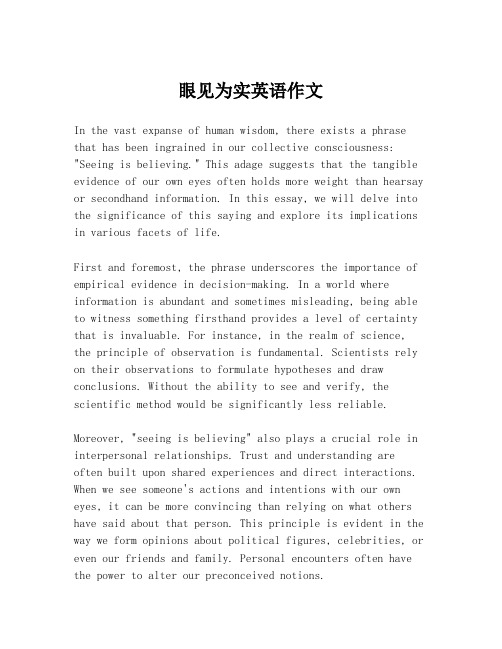
眼见为实英语作文In the vast expanse of human wisdom, there exists a phrase that has been ingrained in our collective consciousness: "Seeing is believing." This adage suggests that the tangible evidence of our own eyes often holds more weight than hearsay or secondhand information. In this essay, we will delve into the significance of this saying and explore its implications in various facets of life.First and foremost, the phrase underscores the importance of empirical evidence in decision-making. In a world where information is abundant and sometimes misleading, being able to witness something firsthand provides a level of certainty that is invaluable. For instance, in the realm of science, the principle of observation is fundamental. Scientists rely on their observations to formulate hypotheses and draw conclusions. Without the ability to see and verify, the scientific method would be significantly less reliable.Moreover, "seeing is believing" also plays a crucial role in interpersonal relationships. Trust and understanding are often built upon shared experiences and direct interactions. When we see someone's actions and intentions with our own eyes, it can be more convincing than relying on what others have said about that person. This principle is evident in the way we form opinions about political figures, celebrities, or even our friends and family. Personal encounters often have the power to alter our preconceived notions.However, it is important to acknowledge the limitations of this saying. While visual evidence can be compelling, it is not always the full story. There are times when context, background information, and a deeper understanding are necessary to form a comprehensive view. For example, a photograph can capture a moment, but it cannot convey the events that led up to it or the consequences that followed. Therefore, while "seeing" is often essential, it should be complemented with critical thinking and a willingness to seek out additional information.In conclusion, the phrase "seeing is believing" encapsulates the human tendency to place great trust in what we can observe directly. It serves as a reminder of the power of firsthand experience and the need for tangible evidence in our quest for truth and understanding. Yet, it also cautions us to be aware of the broader picture and not to be misled by a single perspective or moment. As we navigate through life, balancing the act of seeing with the wisdom of seekingfurther knowledge is key to a well-informed and discerning outlook.。
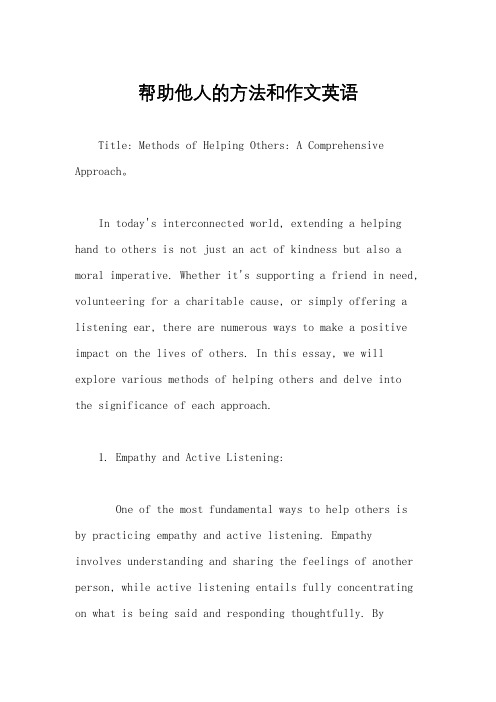
帮助他人的方法和作文英语Title: Methods of Helping Others: A Comprehensive Approach。
In today's interconnected world, extending a helping hand to others is not just an act of kindness but also a moral imperative. Whether it's supporting a friend in need, volunteering for a charitable cause, or simply offering a listening ear, there are numerous ways to make a positive impact on the lives of others. In this essay, we will explore various methods of helping others and delve into the significance of each approach.1. Empathy and Active Listening:One of the most fundamental ways to help others is by practicing empathy and active listening. Empathy involves understanding and sharing the feelings of another person, while active listening entails fully concentrating on what is being said and responding thoughtfully. Byempathizing with others' experiences and actively listening to their concerns, we can provide valuable emotional support and validation. This approach fosters trust and strengthens interpersonal connections, ultimately making individuals feel valued and understood.2. Offering Practical Assistance:Sometimes, people require practical assistance to overcome challenges or accomplish tasks. Whether it's helping a neighbor with household chores, offering to babysit for a busy parent, or assisting a colleague with a project, providing practical help can alleviate stress and lighten the burden for others. Acts of service demonstrate care and solidarity, reinforcing the notion that we are all interconnected members of a community.3. Volunteering and Philanthropy:Volunteering for nonprofit organizations or participating in philanthropic initiatives is another impactful way to help others. Whether it involves servingmeals at a soup kitchen, tutoring underprivileged students, or donating to charitable causes, volunteering allows individuals to contribute their time, skills, or resources to address social issues and improve the well-being of others. Through collective action, communities can address systemic challenges and create positive change on a larger scale.4. Mentoring and Guidance:Providing mentorship and guidance can be transformative for individuals seeking advice or direction in their personal or professional lives. Mentors offer valuable insights, encouragement, and support to help others navigate challenges, set goals, and realize their potential. Whether it's mentoring a younger sibling, coaching a novice colleague, or volunteering as a career mentor, sharing knowledge and experience can empower others to overcome obstacles and achieve success.5. Advocacy and Social Activism:Advocating for social justice and standing up against injustice is a powerful way to help others, especially marginalized or disadvantaged communities. By raising awareness, challenging discriminatory practices, and advocating for policy changes, individuals can address systemic inequalities and promote equity and inclusivity. Social activism involves speaking out against oppression, amplifying marginalized voices, and working towards a more just and equitable society.6. Promoting Mental Health and Well-being:Supporting mental health and well-being is essential for helping others lead fulfilling and meaningful lives. This involves destigmatizing mental health issues, offering support to those struggling with mental illness, and promoting self-care practices. By fostering open conversations about mental health, providing access to resources and support networks, and advocating for mental health awareness, individuals can create a more supportive and compassionate community.In conclusion, there are myriad ways to help others, each with its own unique benefits and significance. Whether it's through empathy and active listening, practical assistance, volunteering and philanthropy, mentorship and guidance, advocacy and social activism, or promoting mental health and well-being, every act of kindness and support contributes to building a more compassionate and equitable society. By embracing a spirit of empathy, solidarity, and collective action, we can make a positive difference in the lives of others and create a brighter future for all.。
SOCIAL BEHA VIOR AND PERSONALITY, 2009, 37(1), 83-94© Society for Personality Research (Inc.)84TRUST AND KNOWLEDGE SHARINGKnowledge sharing is one of the most important managerial concerns in organizations as it creates a competitive advantage in the knowledge economy (Quinn, Anderson, & Finkelstein, 1996). Nevertheless, organizations still do not make enough effort to devise mechanisms that effectively encourage employees to share knowledge. Knowledge is valuable and knowledge-sharing behavior is one kind of social exchange in the workplace (Davenport & Prusak, 1998); it can be expected that those who possess knowledge may not share their knowledge unless they perceive potential benefits. A substantive monetary reward system alone may not be sufficient to encourage employees to exchange knowledge because the focal determinant in a social exchange relationship is trust (Davenport & Prusak, 1998; Wasko & Faraj, 2005). Interpersonal trust thus becomes a crucial factor when an employee decides to share knowledge in the workplace.Past studies have identified trust of colleagues (TOC) as a component of the construct of interpersonal trust (e.g., Wu, Hsu, & Yeh, 2007). Nevertheless, the relationships between employees and supervisors are also important in the workplace (Chen, Tsui, & Farh, 2002), and thus trust of supervisor (TOS) should be taken into account in explaining employees’ knowledge-sharing behaviors. Despite the proposed effect of trust of a supervisor, the empirical results are ambiguous because of potential methodological discrepancies (e.g., Cheng & Li, 2001). It is necessary to reexamine the respective influences of trust of colleagues and trust of supervisor on knowledge-sharing behavior.In addition to the dyadic relationships mentioned above (i.e., TOC and TOS), individual dispositional traits and environmental factors involved in situations where knowledge sharing occurs were also considered in this study. Although in previous studies it has been posited that employees’ altruism and social interaction settings are critical in facilitating knowledge sharing (e.g., Davenport & Prusak, 1998; Dixon, 2000; Nonaka & Takeuchi, 1995), how and when these factors have the most significant effects are still unknown. In our study we tried to close this gap by integrating the construct of interpersonal trust with individual altruism and the social interaction environment in explaining knowledge-sharing behaviors in organizational fields.Based on the above, we had two aims in this study. Our first aim was to investigate the relative effects of trust of colleagues and trust of supervisor on knowledge sharing. Second, we examined the impacts of the propensity of employees to be altruistic and the social interaction environment on the association between interpersonal trust and knowledge sharing. The principal contribution of this study to the research on these subjects is to integrate three levels of influences in explaining knowledge-sharing behaviors, namely altruism at an individual level, trust at an interpersonal level, and social interaction at the team level. Figure 1 depicts the research framework of our study.TRUST AND KNOWLEDGE SHARING8586TRUST AND KNOWLEDGE SHARINGfacilitate social interaction, such as meetings, open and free interaction during work, spending after-work hours together, mentor programs, and so on (Brown, 1991; Davenport & Prusak, 1998; Nonaka & Takeuchi, 1995). In this study, we posited that social interaction environments reinforce the relationship between interpersonal trust and knowledge-sharing behavior because an environment where there is social interaction increases knowledge givers’ expectation that future potential rewards from knowledge recipients will be forthcoming. In other words, individuals situated in a setting where there is little social interaction may not perceive reciprocal relationships that can be maintained in a meaningful way in the long run, and thus these people are less likely to share knowledge.A well-established social interaction environment creates more opportunities for employees to exchange knowledge. When high-TOC possessors of knowledge work in a well-established social interaction environment, they would be more willing to share knowledge than in an environment where social interaction is not well established. Accordingly, a social interaction environment strengthens the relationship between TOC and knowledge-sharing behavior. Likewise, we also reasoned that social interaction would have a positive moderating effect on the relationship between TOS and knowledge sharing. Usually, a supervisor could be one of the participants in social-interaction activities. Employees who have great trust in their supervisors would therefore be more willing to share knowledge because they expect that their sharing behaviors will be more easily observed and recognized by their supervisors in a well-established interaction setting. As a result, social interaction strengthens the relationship between interpersonal trust (i.e., TOC and TOS) and knowledge sharing. Therefore, we formulated the following hypotheses:Hypothesis 2a Social interaction environments positively moderate the positive correlation between trust of colleagues and knowledge-sharing behavior. Hypothesis 2b Social interaction environments positively moderate the positive correlation between trust of supervisor and knowledge-sharing behavior.t he I nfluence of I ndIvIdual a ltruIsmModern economic theorists have assumed that individuals are rational and self-interested. However, alongside self-concern, the altruistic nature also exists (Hoffman, 1981; Zamagni, 1995). People’s altruistic behaviors could be driven by the altruistic nature of an individual or by self-concern such as pursuing a good social reputation, earning friendship or a future benefit and return, and so forth (Becker, 1974; Obler, 1981). Similarly, with regard to knowledge-sharing behavior, there may exist two kinds of motivation − altruistic motivation and self-concern motivation. According to our Hypothesis 1, the relationship between interpersonal trust and knowledge sharing is based on the assumption of a self-concern motivation. That is, knowledge givers expect potential returns fromTRUST AND KNOWLEDGE SHARING87 knowledge recipients in the future. However, some people do have the propensity to share knowledge without expecting returns from others. For possessors of knowledge high in altruism, their knowledge-sharing behaviors depend mainly on their altruistic motivation, and hence interpersonal trust might be less important. In contrast, for possessors of knowledge low in altruism, perceived interpersonal trust becomes an important determinant when they consider sharing knowledge with colleagues. In other words, individuals who have little altruism have to be assured of the potential returns before sharing knowledge. Hence, we proposed that the effect of interpersonal trust is greater for employees low in altruism than for highly altruistic employees.Hypothesis 3a Individual altruism negatively moderates the positive correlation between trust of colleagues and knowledge-sharing behavior.Hypothesis 3b Individual altruism negatively moderates the positive correlation between trust of supervisor and knowledge-sharing behavior.METHODp artIcIpantsWe chose research and development (R & D) teams in high-tech industries in Taiwan as the context to test the research framework. The sampling frame was judged to be adequate for several reasons: (a) R & D projects are more knowledge intensive than labor intensive and hence knowledge sharing is a major component in these companies; (b) R & D members have specific targets (i.e., colleagues and supervisor in the same team) to refer to when they administer the questionnaire; (c) these companies may employ cutting-edge practices in designing interaction environments. During the survey we sent four copies of questionnaires for each of the R & D teams. The final usable sample included 297 employees from 85 R & D teams. The sample of team members had more men (86.2%) than women, was relatively young (78.8% between the ages of 26 and 35), and was well educated (92.6% respondents had completed vocational college or university education).m easuresInterpersonal trust Interpersonal trust consists of employees’ trust of colleagues (TOC) and supervisor (TOS). TOC and TOS were measured with six items adapted from Cheng and Li (2001). The items were statements responded to on 6-point scales anchored by 1 = strongly disagree and 6 = strongly agree. The items of TOC included “I think my colleagues are worthy of trust,” “I think the commitment from my colleagues is credible,” and “I think when I expose my weakness in front of my colleagues, they would help me to overcome it instead of hurting me.” The items of TOS included “I think my supervisor is worthy of88TRUST AND KNOWLEDGE SHARINGtrust,” “I think the commitment from the supervisor is credible,” and “No matter what happens in the future, my supervisor would always give me support and help.” The Cronbach’s alpha values were .85 for TOC and .89 for TOS, indicating that the measures had high internal consistency.Social interaction environment Social interaction was measured with five items modified from Wu et al. (2007). Team leaders were asked to indicate the degree of social interaction on 5-point scales (1 = strongly disagree, 5 = strongly agree). Since members in the same team were assumed to encounter a similar interaction environment, these items were rated only by R & D team leaders. The sample items include “The company holds regular meetings for colleagues to share successful experiences or to resolve work problems,” “The company invites high-performance employees to share their knowledge with others in meetings,” and “There are tearooms and rest rooms where employees can talk to each other and share experiences.” The Cronbach’s alpha for social interaction measures was .80.Altruism This construct was measured with two items adapted from the altruism facet of agreeable personality in the Five-Factor Personality Scale (Costa & McCrae, 1992). The items in this scale were “Some people think I’m selfish and egotistical,” and “Some people think of me as cold and calculating.” Both of the items were reverse scored. Participants were asked to indicate their degree of altruism on 5-point scales (1 = strongly disagree, 5 = strongly agree). The Cronbach’s alpha for this scale was .65.Knowledge sharing Knowledge sharing was measured with 10 items adapted from Cheng and Li (2001). Examples of the items are: “offering suggestions when discussing matters with colleagues”; “being willing to talk about knowledge and experience with colleagues”; and “replying to colleagues’ questions with sincerity.” Participants were asked to indicate their degree of knowledge-sharing behavior on a 6-point scale (1 = strongly disagree, 6 = strongly agree). The Cronbach’s alpha for this scale was .93.The sample’s demographic data including sex, age and education level were also collected as control variables. Table 1 shows the basic characteristics of the team and team members.RESULTSHierarchical regression analyses were conducted to examine the effects of independent variables on knowledge sharing. Table 2 sets out the results of hierarchical regression analyses. Model 1 tested the main effects of trust of colleagues and trust of supervisor. The results indicated that both TOC and TOS had significantly positive effects on knowledge sharing (p < 0.001); increasing trust of colleagues and supervisor enhanced the possibility that an employeeTRUST AND KNOWLEDGE SHARING8990TRUST AND KNOWLEDGE SHARINGTRUST AND KNOWLEDGE SHARING91 altruism exerted no influences on the association between TOS and knowledge sharing. Overall, Hypotheses 2a and 3a were confirmed, but Hypotheses 2b and 3b were not confirmed.CONCLUSION AND DISCUSSIONIn summary, our purpose in this study was to examine the relationship between interpersonal trust and knowledge sharing in the workplace, and to look at the impact of individual altruism and a social interaction environment. We found that employees’ perceived interpersonal trust, either of their colleagues or supervisor, was positively correlated with their knowledge-sharing behaviors in the workplace. These results are consistent with previous studies where it was found that trust is important in knowledge-sharing activities (Currie & Kerrin, 2003; Davenport & Prusak, 1998; Zárraga & Bonache, 2003). Our results also add to the generality of the effects of TOC and TOS on knowledge sharing. In terms of relative effects, trust of colleagues is a stronger determinant of knowledge sharing than is trust of supervisor. Employees’ altruism traits are facilitators for them to share knowledge in the workplace. The trait of altruism also reduces the positive association between trust of colleagues and knowledge sharing. In other words, trust of colleagues is more influential in explaining the act of knowledge sharing for employees who are low in altruism than for highly altruistic ones. This result also sheds light on the nature of altruism. For highly altruistic employees, having trust of colleagues is not a major concern in sharing knowledge. An organizational social interaction environment intensifies the positive association between trust of colleagues and knowledge sharing. That is, the effect of trust of colleagues on knowledge sharing is greater in a well-established social interaction environment. This result supports the argument that increasing interaction activities among employees promotes the spread of knowledge within an organization (Brown, 1991; Davenport & Prusak, 1998; Nonaka & Takeuchi, 1995). In summary, our study contributes to the literature by examining the influences of knowledge sharing across three levels − individual altruism, interpersonal trust, and the team social interaction environment. There are also several managerial implications.First, although knowledge sharing mainly occurs between colleagues, there exists an incremental effect of trust of supervisor in explaining knowledge-sharing behavior (although it should be noted that its effect is less than the effect of trust of colleagues). Being one manifestation of organizational citizenship behavior, knowledge sharing may have instrumental value (Hui, Lam, & Law, 2000); that is, subordinates may try to convey virtues (e.g., being active, helpful, friendly, and collaborative) by their knowledge-sharing behaviors, and may expect or believe that they will, therefore, get future positive evaluation from92TRUST AND KNOWLEDGE SHARINGtheir supervisors. Conversely, unfulfilled expectation, and hence distrust of their supervisors, may reduce their intention to share knowledge.Next, individual altruism has both direct and moderating effects on knowledge sharing, implying that the trait of altruism may be emphasized in human resource management. Since individual traits are relatively stable over time, it would be preferable for organizations to select through their recruiting process, candidates who are already highly altruistic rather than trying to alter employees’ propensity for altruism by training programs after they have been employed. Mutual trust between colleagues should be established for those employees already in organizations who are low on altruism.Moreover, many organizations have established social interaction environments in anticipation that knowledge-sharing behaviors will occur in the workplace. This expectation may be an illusion. Our results suggest that social interaction environments per se do not generate knowledge sharing; instead, knowledge sharing is generated through the effects of interpersonal trust. This means that knowledge sharing does not occur even in a highly facilitated social-interaction setting if people within that setting do not perceive mutual trust. Hence, the next question is how interpersonal trust forms in the workplace. Establishing a workplace friendship may boost interpersonal trust (Nugent & Abolafia, 2006); however, this proposition needs to be empirically tested.Our study had limitations. We did not consider the type of knowledge shared (e.g., tacit knowledge vs. explicit knowledge). For example, tacit knowledge may be more valuable than explicit knowledge and may need more time and more complex social process to be transferred; therefore, greater perceived mutual trust might be needed for the exchange of tacit knowledge. Moreover, we used self-report measures to examine knowledge sharing and altruism in this study, and this practice may cause bias due to social desirability; for example, employees might overestimate their degree of performing knowledge-sharing behaviors. In future studies an attempt could be made to measure these two constructs more objectively through different informants, for example, by asking employees’ colleagues or supervisors to rank their performance on the scales.REFERENCESBecker, G. S. (1974). A theory of social interactions. Journal of Political Economy, 82, 1063-1193. Blau, P. M. (1964). Exchange and power in social life. New York: Wiley.Brown, J. S. (1991). Research that reinvents the corporation. Harvard Business Review, 69, 102-110.Chen, Z. X., Tsui, A. S., & Farh, J. L. (2002). Loyalty to supervisor versus organizational commitment: Relationships to employee performance in China. Journal of Occupational and Organizational Psychology, 75, 339-356.TRUST AND KNOWLEDGE SHARING93 Cheng, J. W., & Li, S. C. (2001). The relationships of organization justice, trust and knowledge sharing behaviors. Journal of Human Resource Management, 1, 69-93 (In Chinese).Costa, P. T., Jr., & McCrae, R. R. (1992). Revised NEO personality inventory (NEO PI-RTM) and NEO Five-Factor inventory (NEO-FFI): Professional manual. Odessa, FL: Psychological Assessment Resources.Currie, G., & Kerrin, M. (2003). Human resource management and knowledge management: Enhancing knowledge sharing in a pharmaceutical company. International Journal of Human Resource Management, 14, 1027-1045.Davenport, T. H., & Prusak, L. (1998). Working knowledge. Boston, MA: Harvard Business School Press.Dixon, N. M. (2000). Common knowledge. Boston, MA: Harvard Business School Press. Hoffman, M. L. (1981). Is altruism part of human nature? Journal of Personality and Social Psychology, 40, 121-137.Hui, C., Lam, S. S. K., & Law, K. K. S. (2000). Instrumental values of organizational citizenship behavior for promotion: A field quasi-experiment. Journal of Applied Psychology, 85(2), 822-828.Nonaka, I., & Takeuchi, H. (1995). The knowledge-creating company. New York: Oxford University Press.Nugent, P. D., & Abolafia, M. Y. (2006). The creation of trust through interaction and exchange: The role of consideration in organizations. Group & Organization Management, 31(6), 628-650. Obler, J. (1981). Private giving in the welfare state. British Journal of Political Science, 11, 17-48. Quinn, J. B., Anderson, P., & Finkelstein, S. (1996). Managing professional intellect: Making the most of the best. Harvard Business Review, 74, 71-80.Wasko, M. M., & Faraj, S. (2005). Why should I share? Examining social capital and knowledge contribution in electronic networks of practice. MIS Quarterly, 29, 35-57.Wu, W. L., Hsu, B. F., & Yeh, R. S. (2007). Fostering the determinants of knowledge transfer: A team-level analysis. Journal of Information Science, 33(3), 326-339.Zamagni, S. (1995). The economics of altruism. Vermont: Edward Elgar.Zárraga, C., & Bonache, J. (2003). Assessing the team environment for knowledge sharing: An empirical analysis. International Journal of Human Resource Management, 14, 1227-1245.。